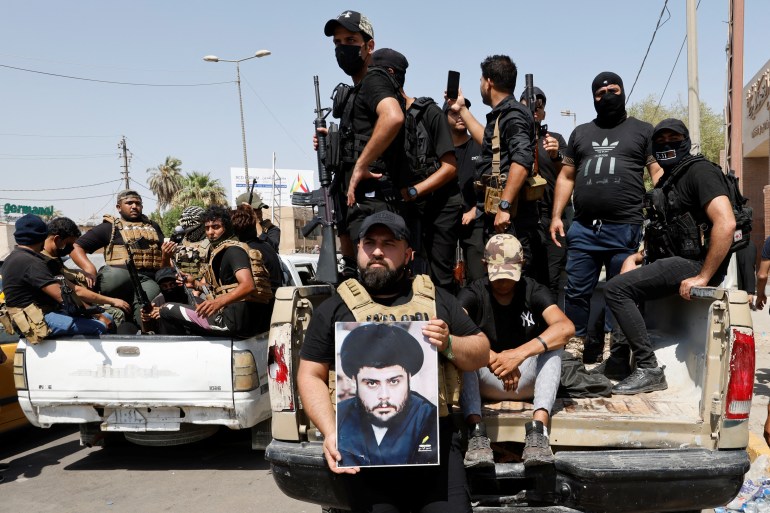Al-Sadr orders supporters to end protests after deadly violence | News

[ad_1]
The influential Shia leader gives his supporters an hour to leave Green Zone after clashes leave 30 people dead.
Iraqi Shia leader Muqtada al-Sadr has called on his supporters to withdraw from Baghdad’s high-security Green Zone after deadly violence overnight rocked the Iraqi capital, raising fears of escalating tensions.
“I apologise to the Iraqi people, the only ones affected by the events,” al-Sadr told reporters from his base in the central Iraqi city of Najaf on Tuesday.
In a televised speech, al-Sadr gave his supporters an hour to leave – and minutes later some could be seen abandoning their positions on live television. Al-Sadr said that if his supporters did not withdraw in the hour he would “distance” himself from them.
Shortly afterwards, the army lifted a nationwide curfew imposed since violence erupted on Monday, raising hopes that there might be a halt to the deadliest violence in years.

The unrest began on Monday when al-Sadr announced he would resign from politics and his supporters stormed the Green Zone, once the stronghold of the United States military that is now home to Iraqi government offices and foreign embassies.
“This is not a revolution,” al-Sadr said in a televised address, which followed pleas for restraint and peace from several Iraqi officials and the United Nations.
His decision to quit politics came after weeks of protests by his supporters in the wake of a political crisis that has left the country without a new government, prime minister or president for months.
Al-Sadr, a grey-bearded Muslim leader with millions of devoted followers who once led a militia against American and Iraqi government forces after the 2003 US-led overthrow of Saddam Hussein, announced on Monday his “definitive retirement” and said he had “decided not to meddle in political affairs”.
Overnight Monday and on Tuesday morning, clashes raged between al-Sadr’s supporters and the army and men of the Hashd al-Shaabi, former Tehran-backed paramilitaries integrated into the Iraqi forces.
On Tuesday morning, medics updated the toll of al-Sadr supporters killed to 30, with some 380 others injured – some with bullet wounds and others suffering from tear gas inhalation.
A mass funeral was held on Tuesday in Najaf, a Shia holy city, for some of the protesters killed in Baghdad.
Government deadlock
Iraq’s government has been deadlocked since al-Sadr’s party won the largest share of seats in October parliamentary elections but not enough to secure a majority government – unleashing months of infighting between different Shia factions.
Al-Sadr refused to negotiate with his Iran-backed Shia rivals, and his withdrawal on Monday catapulted Iraq into political uncertainty.
Iran closed its borders to Iraq on Tuesday – a sign of Tehran’s concern that the chaos could spread, though even before al-Sadr’s order, streets beyond the capital’s government quarter largely remained calm.
Earlier on Tuesday, al-Sadr’s supporters could be seen on live television firing machine guns and rocket-propelled grenades into the heavily fortified area through a section of pulled-down concrete walls. Security forces armed with machine guns inside the zone sporadically returned fire.
Al-Sadr’s nationalist rhetoric and reform agenda resonate powerfully with his supporters, who largely hail from Iraq’s poorest sectors of society and were historically shut out of the political system.
[ad_2]
Source link




